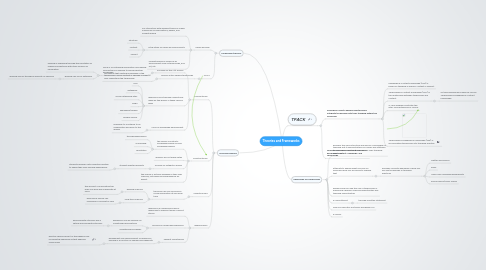
1. Learning Theories
1.1. Connectivism
1.1.1. Focused on the 21st learner
1.1.1.1. focus is on retrieving information and making connections as oppose to having existing knowledge
1.1.1.1.1. learning is achieving through the facilitation of making connections with other sources of information
1.1.1.1.2. learning can occur externally
1.1.2. learning occurs through connections made by the learner in these various ways
1.1.2.1. Plns
1.1.2.2. databases
1.1.2.3. social networking sites
1.1.2.4. blogs
1.1.2.5. wikispaces/pbwiki
1.1.2.6. google scholar
1.1.3. cycle of knowledge development
1.1.3.1. individual to a network to an organization and back to the learner
1.2. Constructivism
1.2.1. the learner constructs knowledge based on prior knowledge gained
1.2.1.1. through experiences
1.2.1.2. scaffolidng
1.2.1.3. facilitation
1.2.2. learners are not blank slates
1.2.3. focuses on authentic learner
1.2.3.1. student directed projects
1.2.3.1.1. students develop meta cognitive abilities to shape their own learning experiences
1.2.4. the learner is actively engaged in their own learning, not being fed knowledge by an expert
1.3. Cognitive load
1.3.1. the brain can only process so much information at any given time
1.3.1.1. working memory
1.3.1.1.1. the amount of information the brain can hold and manipulate at once
1.3.1.2. long-term memory
1.3.1.2.1. how long a learner can remember a concept or idea
1.4. Behaviourism
1.4.1. learning as a complex process of responses to different kinds of direct stimuli
1.4.2. focuses on observable behaviour
1.4.2.1. behaviours can be learned via conditioned associations
1.4.2.1.1. environmental stimulus and a natural environmental stimulus
1.4.2.2. conditioned processes
1.4.3. operant conditioning
1.4.3.1. punishment and reinforcement on behaviour, learning is a function of change and behaviour
1.4.3.1.1. positive reinforcement of the behavior will increase the likelihood of that behavior reoccurring
2. Technology theories
2.1. media ecology
2.1.1. our interaction with different types of media influences our perceptions, beliefs, and understanding
2.1.2. is the study of media as environments
2.1.2.1. structure
2.1.2.2. content
2.1.2.3. impact
2.1.3. understanding of media as an environment such as technology, and art, etc
2.2. SCOT
2.2.1. human action shapes technology
2.2.1.1. recognizes that existing knowledge of the technology's social context is needed in order to fully understand the technology
3. TPACK
3.1. framework used to explain how teachers integrate technology into their teaching within the classroom
3.1.1. Pedagogical Content Knowledge (PCK) is based on teaching a specific content or subject
3.1.2. Technological Content Knowledge (TCK) is the relationship between technology and content
3.1.2.1. All three subdomains make up TPACK Technological Pedagogical Content Knowledge
3.1.3. A Venn diagram illustrates the inter-connectedness of TPACK
3.1.4. Technological Pedagogical Knowledge (TPK) is incorporating technology into teaching practice
3.2. complex framework involving 3 forms of knowledge Content, Pedagogy, and Technology
4. Philosophy of Teachnology
4.1. Basically the same structure and idea of a Philosophy of teaching but it demonstrates your values and attitudes towards implementing technology in ones teaching practices
4.2. attempts to explain what you plan on doing and how you are going to achieve that
4.2.1. provides concrete examples of how you will use technology in teaching practices
4.2.1.1. Twitter discussions
4.2.1.2. Ipads
4.2.1.3. Video clips alongside powerpoints
4.2.1.4. movie videos/music videos
4.3. explains how you see the use of technology in enhancing children's learning opportunities and teaching opportunities
4.4. a committment
4.4.1. through a written statement
